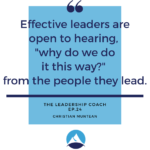Fear: A Leader’s Greatest Enemy

 (Rev May 2020)
(Rev May 2020)
Several years ago, I sat down for coffee with the leader of an established organization. I’ll call him Mark. As we talked, Mark detailed a genuinely inspiring vision for their future. I asked, “So, what are your next steps to create this vision?”
Unexpectedly, the question seemed to deflate him. “I don’t think people are ready for it yet,” Mark replied. He explained how many of their people were “married to the status-quo” and how they might lose engagement if he initiated change. He began to talk about how change is always hard and there is always resistance.
Then he shifted. He began to suggest that it might be worth losing some people. And his voice took on a defiant tone.
I liked his vision, but doubted his judgment.
I started polling people, informally, within the organization to get their pulse. From what I heard, they actually shared the same vision as Mark. They genuinely wanted change. In fact, they reported that Mark had been hinting at this change for some time; and they couldn’t understand what was holding him up.
Mark was afraid of many things: Fear of losing trust, fear of failure, fear of the unknown.
As a result, he was why they were stuck. Instead of recognizing or owning that it was his stuff’ that was holding them back; he blamed others.
This is a common leadership struggle. Mark is not a bad guy. But he is wrestling with fear.
Most leaders struggle with fear: “What will happen if I do X? Am I succeeding enough? Will I lose approval? Am I making the wrong decision? Am I afraid of difficult conversations?
Fear is one of the most formidable enemies that any leader will face. It is what prevents us from taking advantage of opportunities, making timely changes, or receiving assistance. It is what builds the towers of isolation that many leaders find themselves trapped within.
There are three main categories of fear that will confront a leader:
1. Fear of the Unknown: This is the same fear that we had as children – the fear of what went ‘bump’ in the night. We don’t know what’s there; but we fear horrible things.
Antidote: Turn the light on. Get accurate and current information. Solicit feedback from a wide variety of sources. Successful leaders identify their fears and ensure they have adequate information to know what they are actually facing. Truth usually dispels fear.
2. Fear of The Assumed: This is similar to the Fear of the Unknown. The difference is the Fear of the Assumed means that the leader has created a vivid story that ‘fills in the blanks’ of the unknown. This is actually more crippling than Fear of the Unknown because leaders believe they actually do know.
I hear these stories nearly every day. They are incredibly detailed and usually have little basis in reality. Leaders assume that confronting a staff performance issue will end in tears. We assume that change will be resisted. We assume that no one will support us. Leaders can also assume they know what others think, feel and believe.
Antidote: Test your assumptions. Even the most highly intuitive and intelligent leader isn’t all-knowing. Practice humility and test your assumptions. Identify the stories you tell yourself. Verify their accuracy as best as you can.
3. Fear of Verified Reality: This is the least common cause for fear. It is different than Fear of the Unknown. Here we’ve ‘turned the light on’ and there is, in fact, a monster under the bed. It is different from the Fear of the Assumed because we have real evidence that the monster is real.
Antidote: Preparation. Preparation is the best way to face genuine challenges. Don’t wait for a problem to emerge. I once worked in international disaster relief. I primarily worked in conflict zones. Giving in to flight, fight or freeze responses could easily get someone hurt or killed. We needed to be prepared for the reasonably expected as well as the unexpected.
For the reasonably expected: Regularly examine your environment and determine what new threats or challenges you might need to prepare for, and which are no longer relevant. Make basic preparations that will get your team, or organization, to a place of basic security (preparing for event A, B or C). This might mean building a financial reserve, or forging agreements with partner organizations, or improving leadership skills across the organization.
For the unexpected: Practice and maintain good communication with your team. Create and maintain a healthy, responsive organization. Stay aware of your environment and correct organizational myopia. Maintain financial and ‘goodwill’ reserves to draw from (goodwill reserves are favors that you can count on from others when you are in need). Familiarize yourself with the typically unused resources that your team has to offer. Identify and be willing to use resources external to your organization. Avoid operating in isolation.
Effective leadership requires courage. Sometimes, the most difficult leadership challenges have more to do with facing down the imagined stories we believe. Whatever these stories actually do for us – they aren’t helping us be more effective leaders.
Begin to face your fears. Begin by exploring the unknown and testing your assumptions.
What are the fears (or concerns or anxieties) that you tend to wrestle with? What is one thing you need to do to face and overcome it?
Take good care,
Christian
Please join me on my social media channels:
![]()
![]()
![]()
![]()
![]()

Find the value of your company with my free assessment tool: The Value Builder System
The Value Builder System™ is a 13-minute online questionnaire that evaluates your business on the eight factors that contribute more to its attractiveness and value. These factors are scored on a scale of 1-100. Businesses that score over 80 are likely to command 70%-100% higher value than others.
 In my podcast, THE LEADERSHIP COACH, we explore effective, high impact and enjoyable leadership. We talk about personal development and the attributes that all effective leaders possess. I interview other leadership experts who share their knowledge and tips to help you build the confidence to lead and learn the habits of good decision-making.
In my podcast, THE LEADERSHIP COACH, we explore effective, high impact and enjoyable leadership. We talk about personal development and the attributes that all effective leaders possess. I interview other leadership experts who share their knowledge and tips to help you build the confidence to lead and learn the habits of good decision-making.
Now Available! – Ep.24 – Curiosity Makes You Stronger
Opportunities
Free Resource: How To Accomplish More Without Doing More is a workbook I created to walk leaders through a process of helping you own your calendar, liberate your time, and still get more done. Download it for free!
Executive and Leadership Coaching: Do you feel overwhelmed? Are you not getting the results you expect from the effort you are putting in? Do you find yourself facing similar challenges time and time again? Would you like to change specific ways of relating or reacting? If you would like to experience predictable, measurable growth Contact me.
Profitable Exit Strategy Workshop: Are you a business owner or partner? Are you over 55? Are you starting to think about exiting your business or active management in the next 3-5 years?
- Are you curious about what your business might be worth?
- Would you like to discover the specific steps you need to take to increase its value and become highly attractive to a buyer?
- Are you planning on handing it over to family or employees and you want to ensure long-term success?
If so, contact me now
Article Categories
Popular articles

Download my free 10-page eBook:
How To Accomplish More Without Doing More:
Eight Proven Strategies To Change Your Life
Discover how to save eight hours during your workweek-even if you're too busy to even think about it. The resource every maxed out executive needs.
